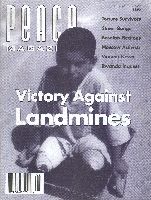
Peace Magazine Nov-Dec 1997, page 4. Some rights reserved.
Search for other articles by PMag staff here
In 1991, when the Vietnam Veterans of America Foundation and Medico Frankfurt started to work together internationally for a ban on anti-personnel mines, there were few peace activists who expected this new campaign - which took the name "International Campaign to Ban Landmines" in 1993 - to make the same sort of impact as the anti-nuclear movement had done in the 1980s.
Just six years later, however, the landmines campaign achieved respectability, and managed to change official policy over much of the world, in a way the anti-nuclear movement never managed. September's Oslo Conference, meeting in the wake of the death of the Princess of Wales - an unlikely but deeply committed supporter of a global ban - came up with a landmark treaty. The USA's refusal to commit to a comprehensive ban, despite exhaustive diplomatic efforts and negotiations, is a setback, of course - but there continues to be plenty of scope for international pressure to bring them on board. The treaty has also sent the Russian government into a series of flip-flops, though on balance President Boris Yeltsin appears to favour signing.
And now the International Campaign to Ban Landmines has been awarded the 1997 Nobel Peace Prize. Canada's Minister of Foreign Affairs, Lloyd Axworthy, who sponsored the treaty process at the governmental level and who has invested much of his personal integrity in the landmines issue, had also been considered for the award. But it is right that the International Campaign, a grassroots campaigning, informational and lobbying group which began its work at a time when an global ban on landmines seemed an impossibly utopian dream, took the prize.
Peace Magazine warmly congratulates the International Campaign and its coordinator Jody Williams, who shares the award. On page 14 inside, Celina Tuttle of Mines Action Canada analyses the Oslo conference and the treaty which will be signed in Ottawa in early December.
It is now eleven years since Mordechai Vanunu was kidnapped by Mossad agents, tried and imprisoned for daring to tell the world what he knew about Israel's covert nuclear weapons program. This year, international Vanunu supporters joined local anti-nuclear activists for a week of actions in Israel. The Israeli movement is young, energetic, and got a great boost from a Vanunu name-check at a U2 concert in Tel Aviv. You can read Stephen Dankowich's diary of the week's protests on page 16 inside.
As we go to press, Peace Magazine editor-in-chief Metta Spencer is doing research in Russia, the Czech Republic, and former-Yugoslavia. You'll find her impressions of the International Peace Bureau's recent Moscow conference on page 8 inside.
Ken Simons, managing editor

Peace Magazine Nov-Dec 1997, page 4. Some rights reserved.
Search for other articles by PMag staff here